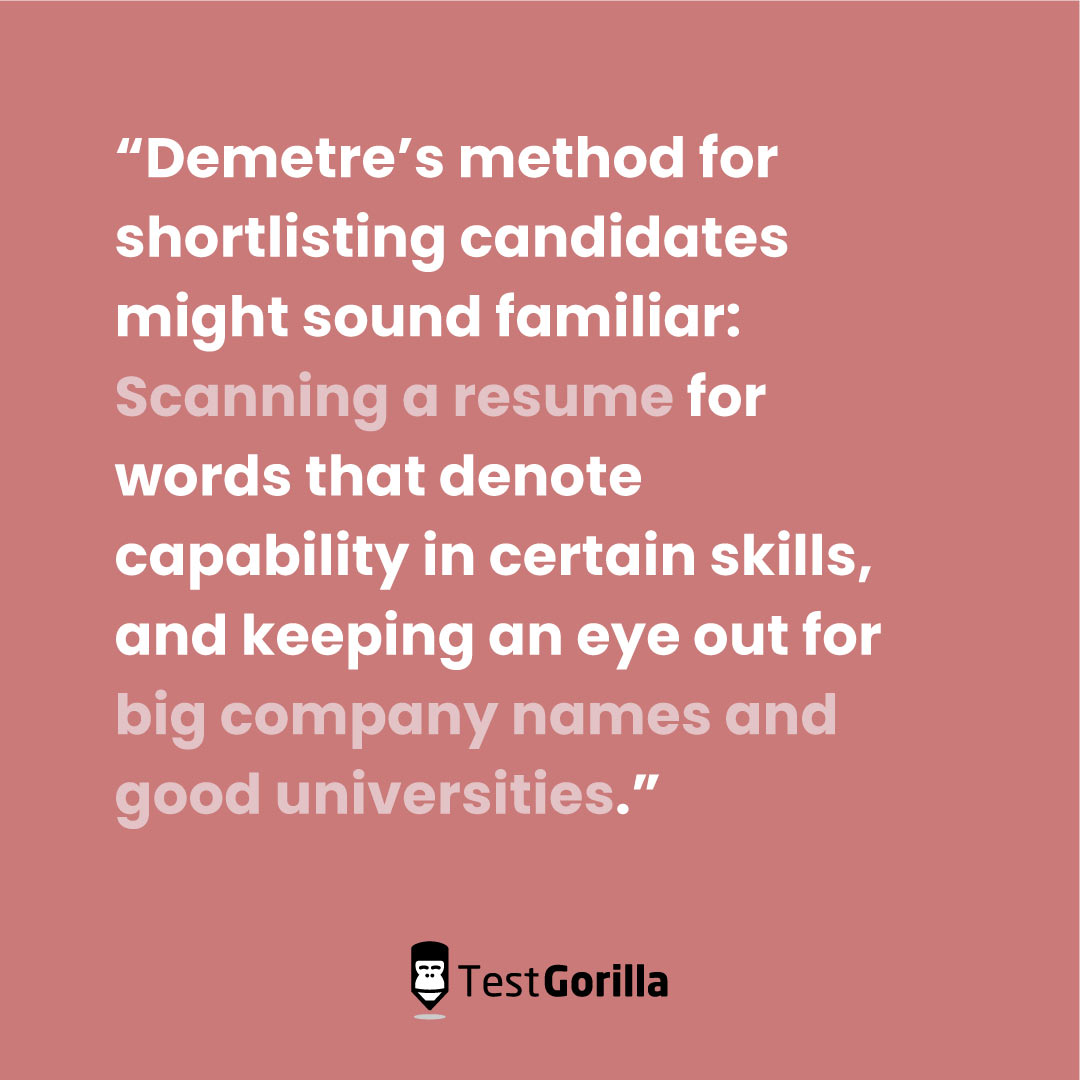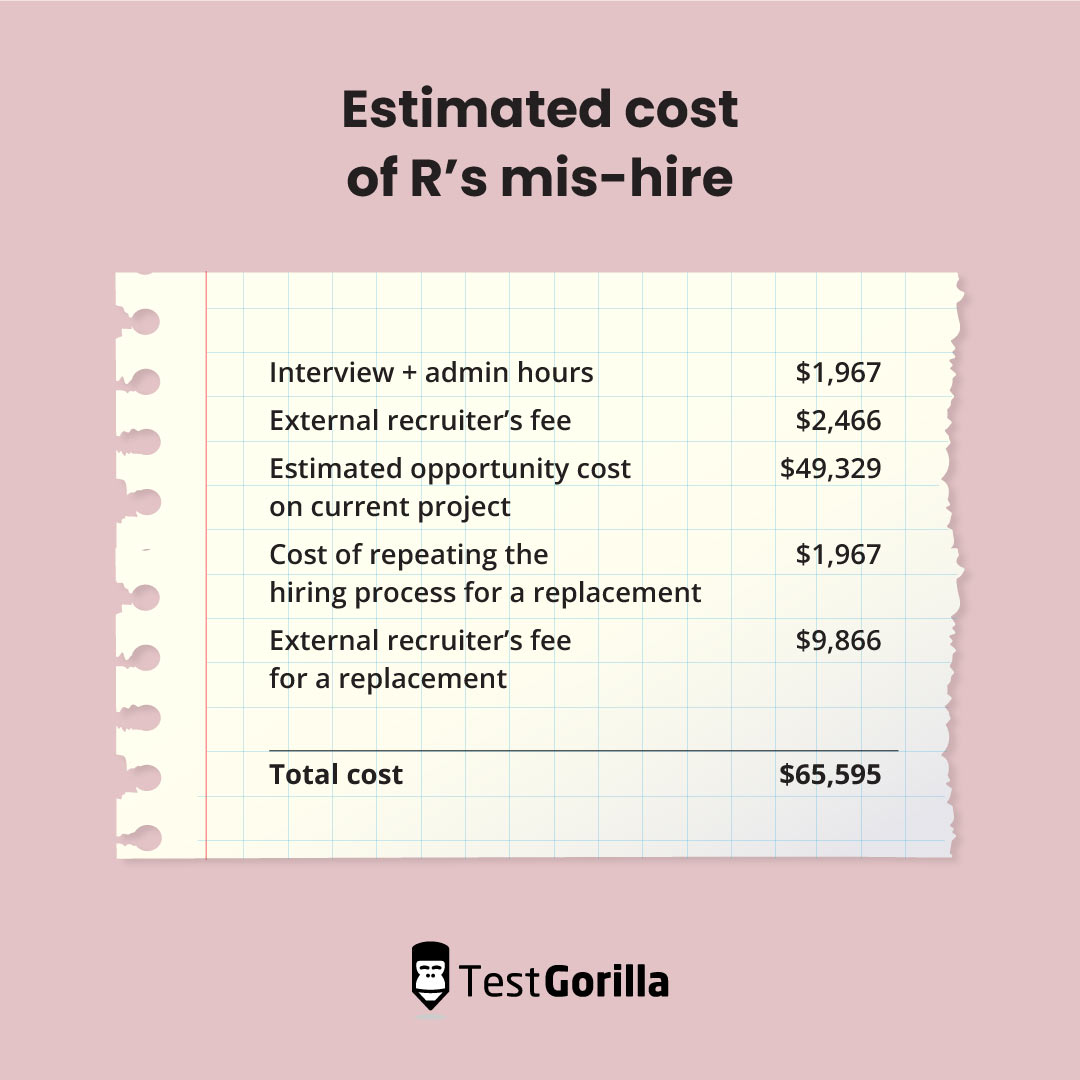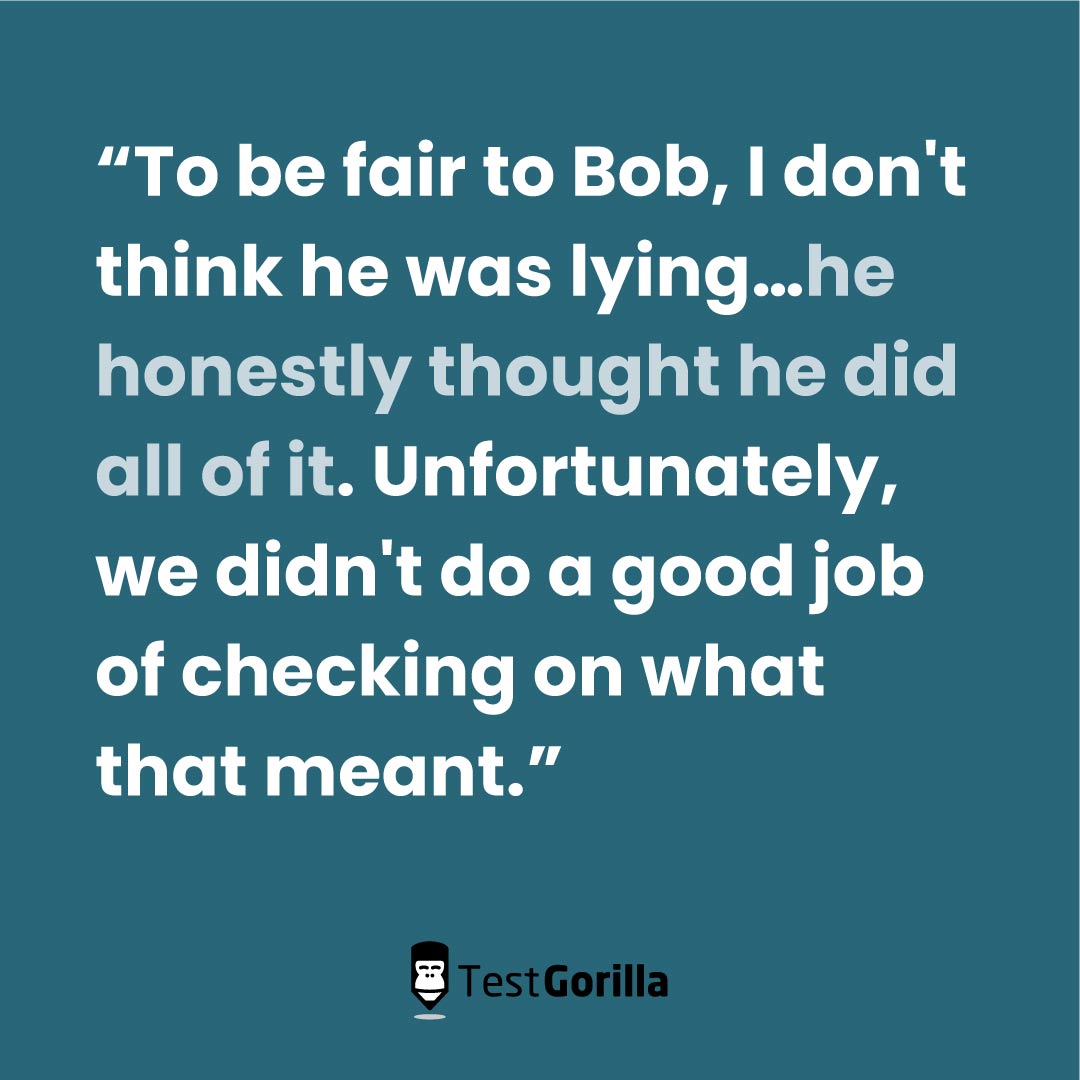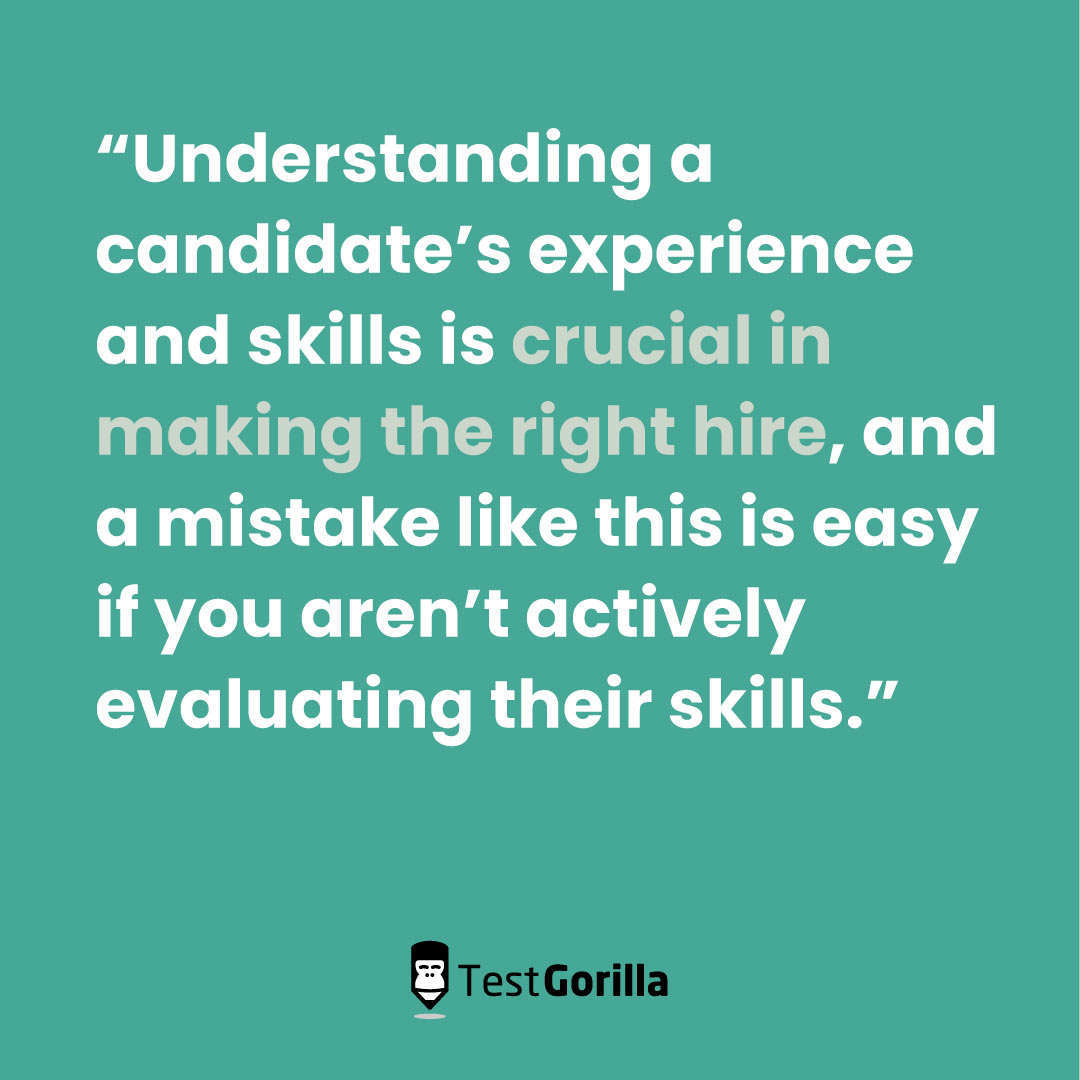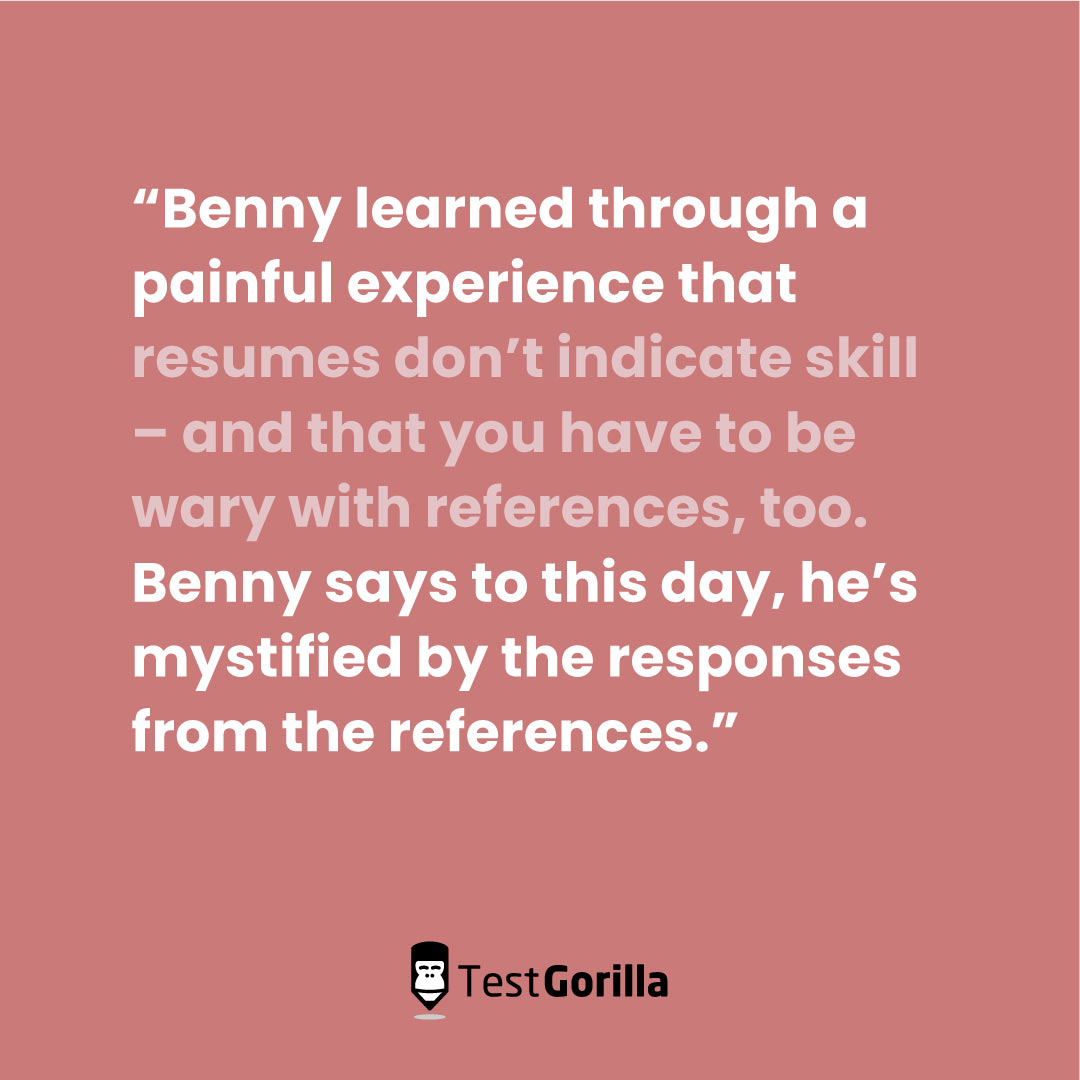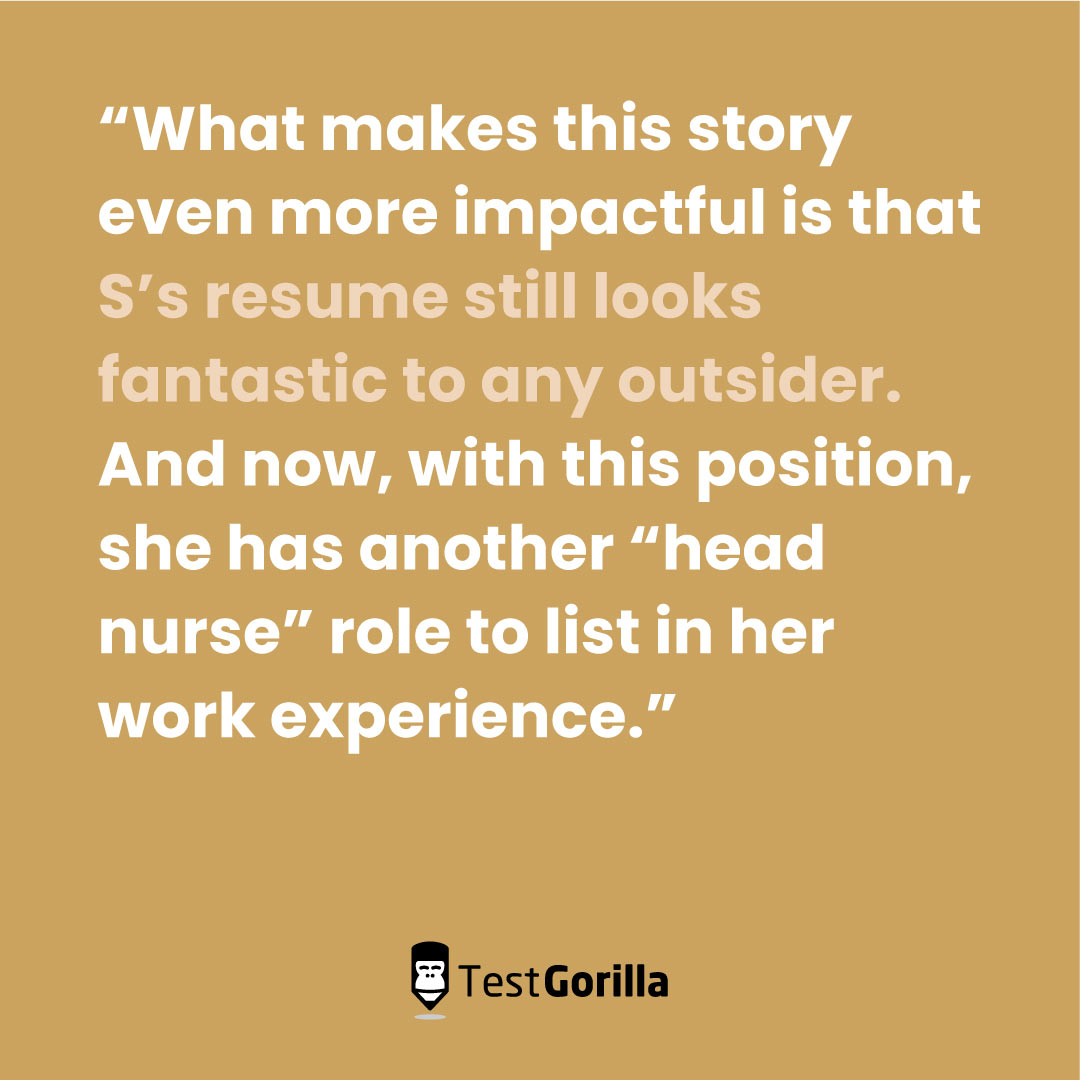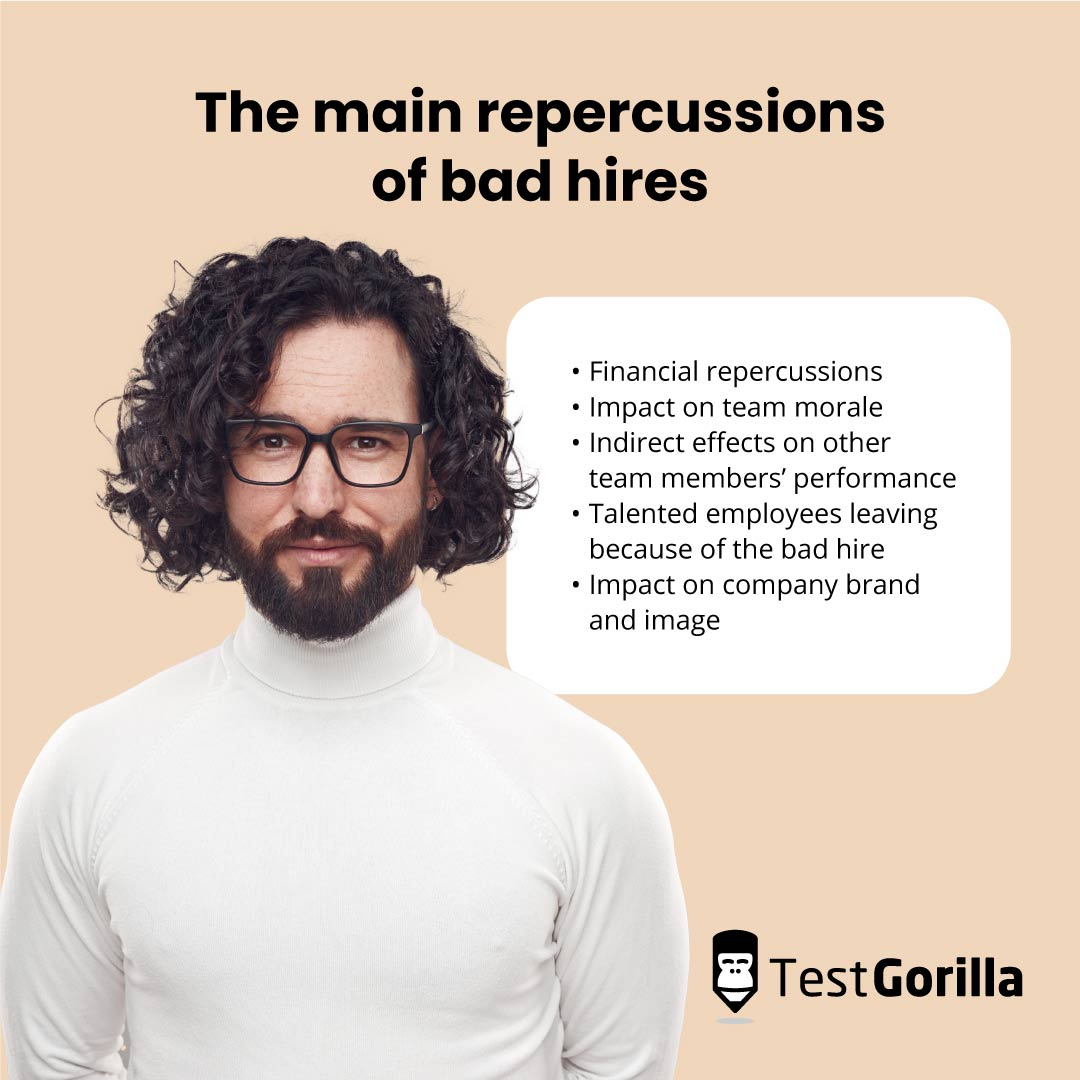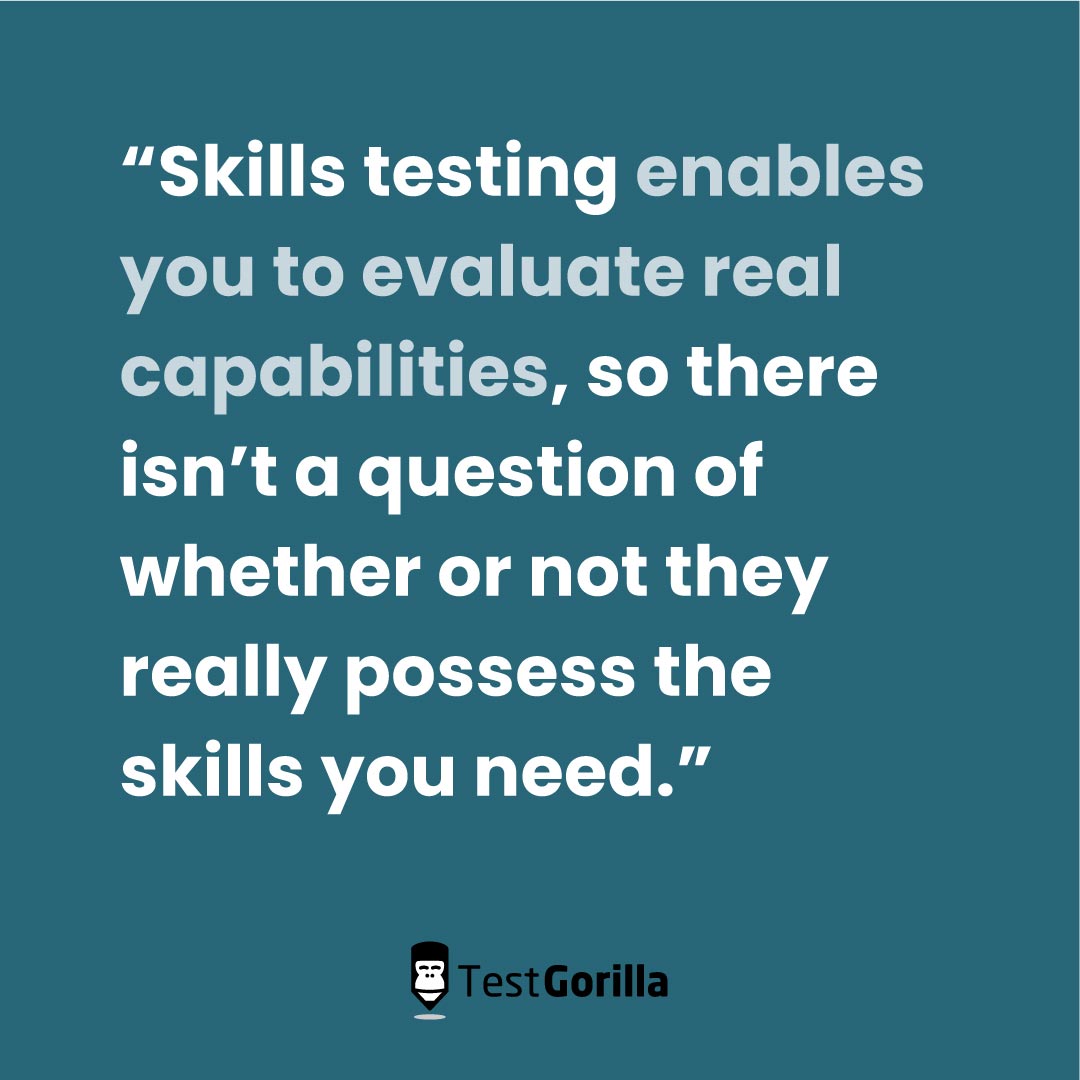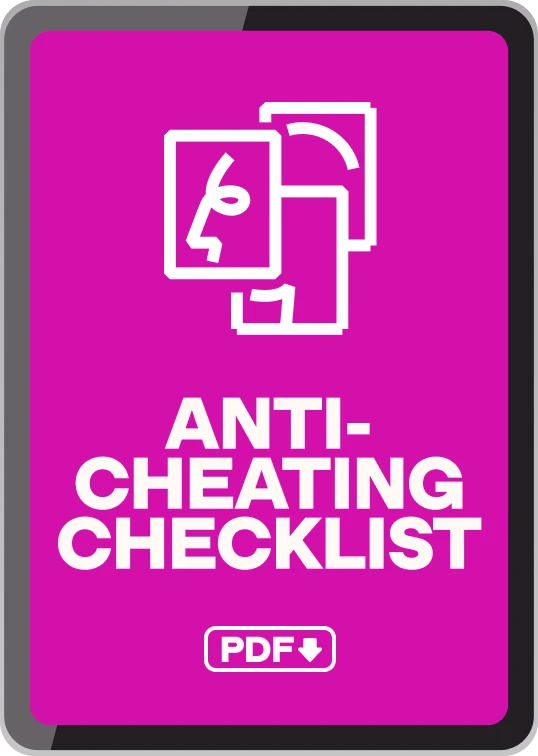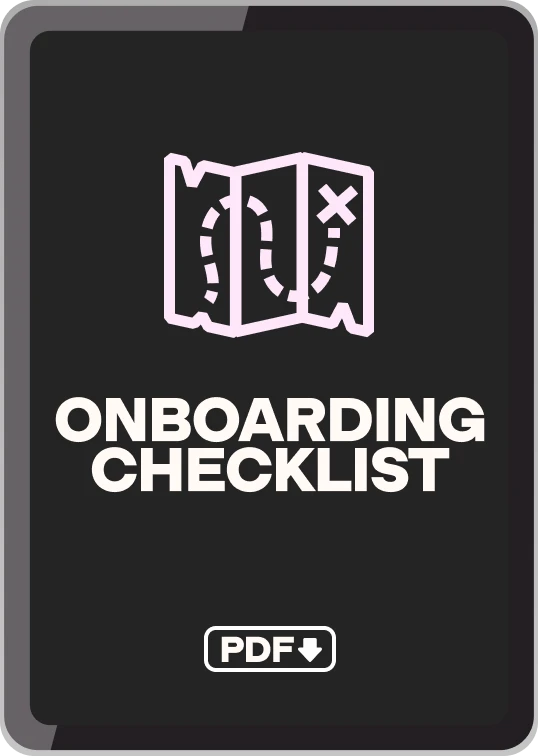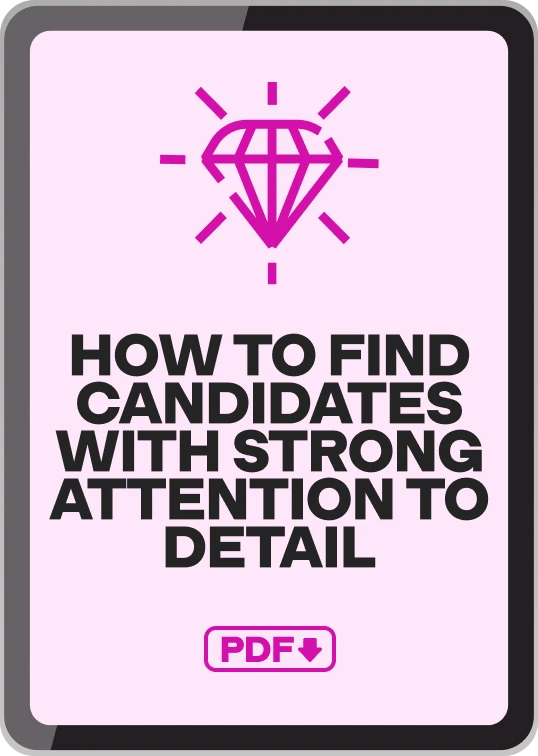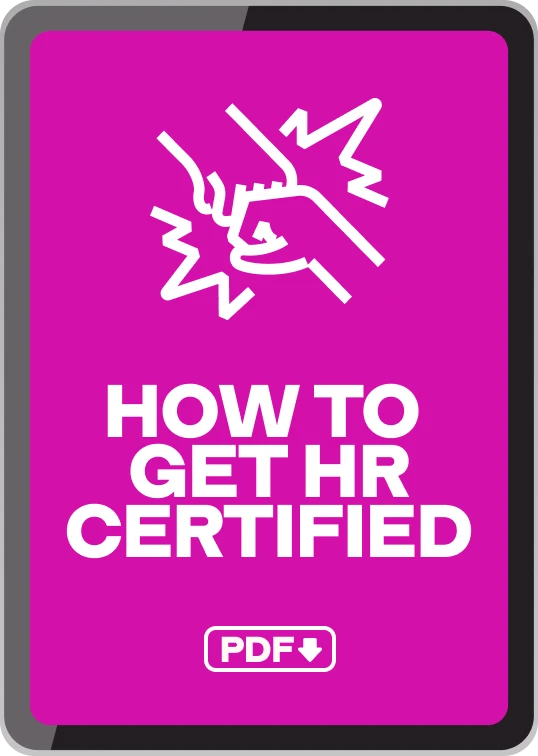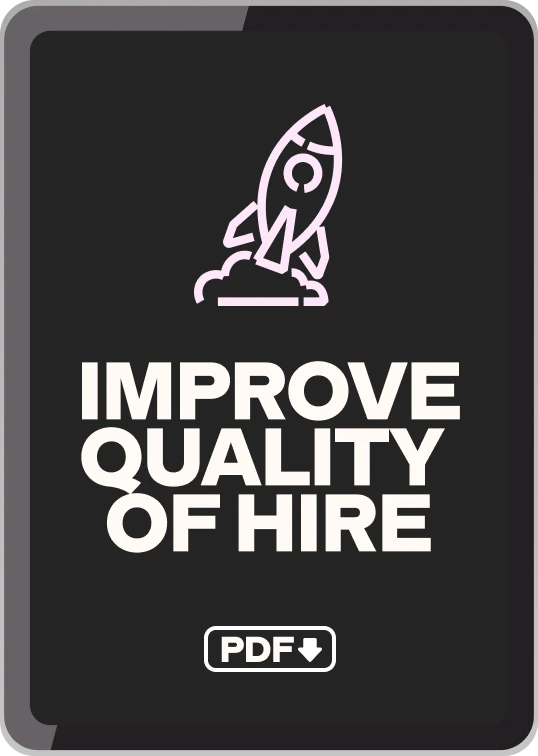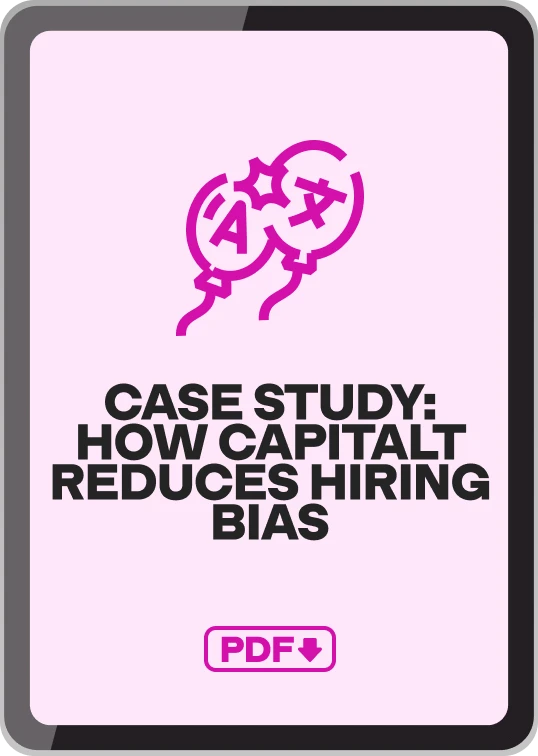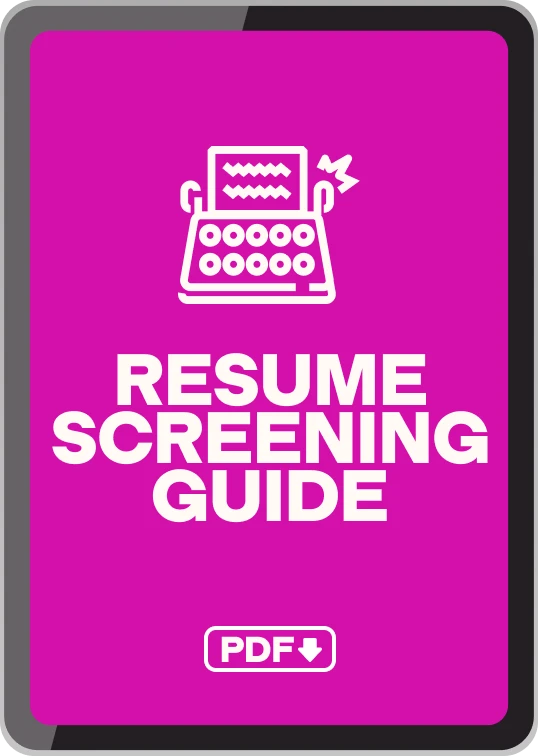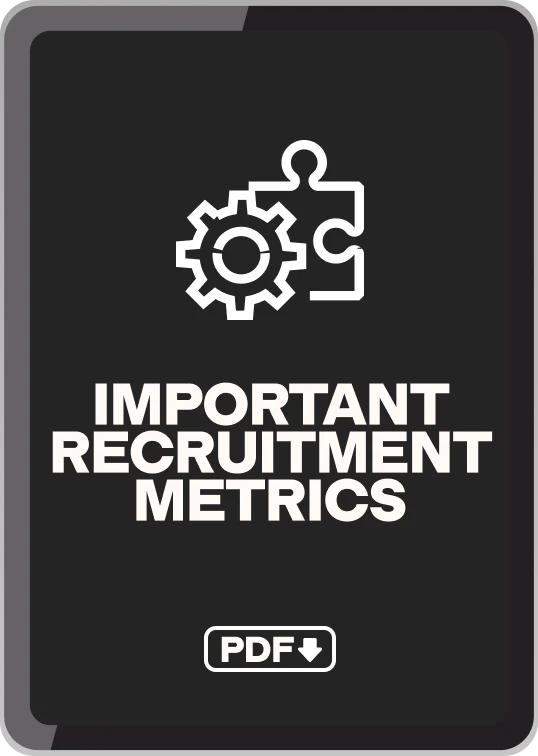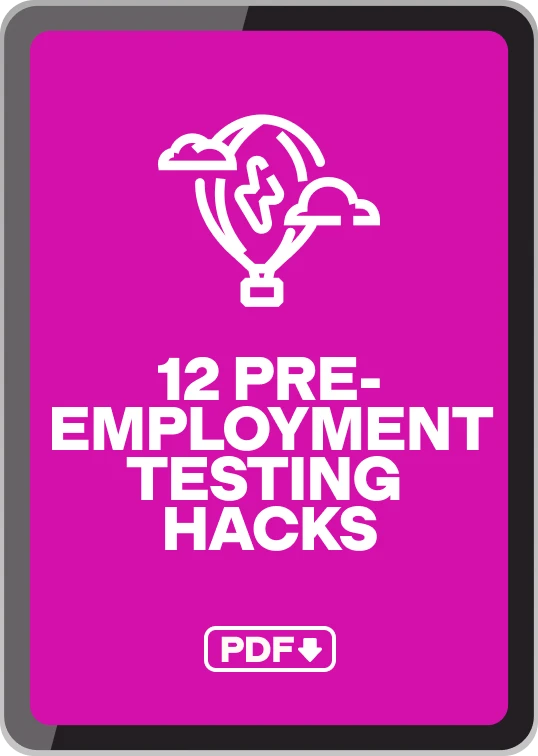5 stories from resume recruiting hell
More and more hiring managers are admitting that resumes aren’t a solid indicator of a candidate’s capability. Not only are they self-informed documents, but one in three Americans admit to lying on them.[1]
Many recruiters are aware of the number of applicants that lie on their resumes, but it has a much greater impact than simple dishonesty.
Overreliance on resumes during the hiring process can lead to a bad hire. These bad hires can extend into a nightmare, costing thousands of dollars, wasting company time, and impacting your existing team’s morale.
We’ve scoured the crypts and retrieved a handful of horror stories from resume recruiting hell to give you a taste of the chaos that occurs when a resume indicates that a candidate has the right skills, but you have no way to confirm it.
Table of contents
- Story 1: A “big” company name doesn’t indicate quality
- Story 2: When a candidate overestimates their capability
- Story 3: Same title, different roles
- Story 4: One bad hire affects the whole team
- Story 5: One bad hire destroys a positive environment
- The impact of a hiring horror story
- How a skills-based approach can prevent a hiring horror story
- Adopt skills testing and prevent the next horror story
- Sources
Story 1: A “big” company name doesn’t indicate quality
Demetre Constantopoulos, a hiring manager at Applied, learned the hard way that resumes aren’t a good indicator of capability.
Here’s the story of why he stopped using resumes for good.
In Demetre’s previous role, he was in charge of managing information analytics for a multinational company. As the company grew, his workload grew, too.
He needed a new analyst to help with his workload and got to work sorting through dozens of resumes.
Demetre’s method for shortlisting candidates might sound familiar: Scanning a resume for words that denote capability in certain skills, and keeping an eye out for big company names and good universities.
After hours of scanning resume after resume, looking for keywords that might suggest that a candidate was stellar in customer segmentation and sales activity reporting…
Eureka. He found exactly what he was looking for – a candidate with experience at “good” companies and a great academic record.
For anonymity, we’ll call this person “R.”
The interview went well, and R recited their resume back to Demetre verbatim. This didn’t raise any red flags; after all, it’s what plenty of hiring managers look for in an interviewee.
R passed another interview successfully, this time with the director. The process was flawless. It looked like R was going to be a real purple squirrel in the wild.
But right when R was hired officially, the curtain fell and revealed the truth.
Once R was in the role, they had about a tenth of the technical capability they claimed to have during the hiring process. It was shocking that they lacked normal, essential analytical skills.
They also dropped their smiling, professional facade on the first day.
R was rigid, disagreeable, and argued about every job responsibility that wasn’t explicitly described in the original job description.
Job descriptions typically give an overview of the main responsibilities. It would be exhausting to list them all.
In just one week after hiring, R started a screaming argument in the middle of the office. Even the chief executives were drawn into the room out of pure curiosity.
It isn’t surprising that R was terminated soon after.
Demetre then estimated the total cost of this nightmare:
Interview + admin hours: $1,967
External recruiter’s fee: $2,466
Estimated opportunity cost on current project: $49,329
Cost of repeating the hiring process for a replacement: $1,967
External recruiter’s fee for a replacement: $9,866
The total cost ended up being $65,595.
Demetre says it also cost him a few sleepless nights and an embarrassed, red face.
Resumes filled with big names and the right keywords don’t indicate technical performance. They also don’t convey personality, values, and culture.
If R had taken a skill assessment, their lack of analytical skills and disagreeable attitude would have been apparent from the application stage.
Plus, skill tests would have clarified R’s role and responsibilities for them, and they wouldn’t have been surprised by the work they were expected to do.
Story 2: When a candidate overestimates their capability
This story comes from Reddit user GearHead54.
A small coding team, primarily working on embedded firmware and printed circuit board (PCB) programming, lost their senior coder, and they desperately needed to fill the seat.
A candidate came forward with an excellent, lengthy resume – a previous chief technology officer at a great startup? The team was counting their lucky stars.
During the interview, they asked Bob how much of the coding for his most recent project was his work. His response:
“All of it.”
Wow.
For a small company, like the one this Redditor worked for, this was entirely possible, so no one doubted him.
In the first week after hiring, they had trouble getting Bob’s code to compile. They went over to check it out themselves and noticed the header file was missing.
“I’m pretty sure that’s optional…” was Bob’s plaintive reply.
The Redditor took a deep breath – Bob’s a little rusty on coding. That’s okay. We can work on that.
Next was a PCB review. Bob starts moving code and re-routing things. He tells them he’s doing it “just because” and for no real reason.
In one critical circuit, Bob insists the Redditor doesn’t know what they’re doing and adds a diode. A diode that’s in the wrong place…which defeats the purpose of the circuit.
Another deep breath. We all make mistakes!
The months with Bob went on – changing things without justification, requiring constant hand-holding, and frustrating the rest of the team.
They started to realize that Bob doesn’t have the skills he claimed.
The Redditor eventually attended a trade show and met one of Bob’s old colleagues from the startup. They were shocked, but not surprised, that this colleague actually wrote the code for the project that Bob claimed ownership of.
This colleague said that Bob mainly told others what to do, then claimed he did it.
The Redditor reflects:
“To be fair to Bob, I don’t think he was lying…he honestly thought he did all of it. Unfortunately, we didn’t do a good job of checking on what that meant.”
After months of eating away at the team’s time and sanity, Bob was terminated.
The Redditor ends their story by saying they could have saved months of headaches and a senior engineer’s salary if they had been able to test Bob’s skill.
Skills tests give you a better understanding of what that person’s skills are versus what they think they are. Because often, candidates aren’t lying, they just don’t properly label their own skills.
Story 3: Same title, different roles
AJ Silbermann-Moffitt, a senior editor at search marketing agency Tandem Buzz, recently got a promotion. This meant that she needed a replacement.
Hiring someone for your own position? How hard can it be to assess your own skills and capabilities and hire someone suitable?
Much harder than you think.
AJ had her eye on a particular candidate. She was coming straight from another senior editor position – perfect! They won’t even need to train her on the necessary tools and software.
AJ thought she would already be familiar with the responsibilities, too.
They invited her to an interview. She answered every question perfectly. They were chomping at the bit to extend an offer.
Unfortunately, they didn’t get past the first week before discovering that AJ’s replacement did not possess her skills. Not even close.
AJ did her best to train the new hire in, but even the simplest tasks had the new hire confused. She even found it difficult to even enter information into Microsoft Excel.
Every task was met with a blank stare, like a deer in headlights.
The company found out the hard way that a senior editor at a television station couldn’t produce the same quality at a marketing agency. It turns out they have vastly different responsibilities, software, and structure.
But a resume doesn’t show that.
As much as they tried, she just couldn’t grasp the job. The hire was terminated, wasting company money and taking hours of AJ’s time and effort.
Understanding a candidate’s experience and skills is crucial in making the right hire, and a mistake like this is easy if you aren’t actively evaluating their skills.
Just think, this whole debacle could have been diverted with a simple Microsoft Excel test.
Skills tests would have also shown the candidate that this new senior editor position was much different than her last, changing their expectations for the role.
Story 4: One bad hire affects the whole team
Benny Sisko, a manager, needed to fill a particularly tricky position.[2] He knew this one would be tough but had no idea how truly ghastly the next three months would be.
It only took Benny a couple of weeks to find what he thought he was looking for. This candidate had a stellar resume: excellent listed skills and the right experience.
It was almost as if this candidate had read their minds and checked off every box they wanted.
They called the candidate in for an interview, and he seemed just as perfect in person. He said he left his previous position because of a lack of opportunities and was looking for new development and challenges.
Isn’t that what every interviewer wants to hear?
The candidate proceeded through interviews with the IT team, and then Human Resources. Perfect again.
What about his references? Perfect, too. A former supervisor provided nothing but praise, and a former colleague backed this supervisor up.
And Benny thought this process would be hard.
But he discovered he had made a huge mistake soon after the first day.
This candidate had obviously lied about his skill level on his resume…and in the interview.
This position was a high-level role, with the second-highest salary in the office, and the new hire was struggling with basic tasks. He also refused to ask for help.
After some time, his work queue was racking up, and customers were getting frustrated. He even claimed that he didn’t want to work on tasks that “didn’t interest him.”
Benny was put in a difficult situation. He started delegating the new hire’s tasks to others.
Benny was quoted as saying: “We were at a point where, regardless of hurt feelings, getting the work done was key.”
They tried their best to make it work. They had numerous 1:1 meetings with the new hire. They sent him to training, but nothing changed.
Benny’s team started to grow frustrated and resentful. Three separate, loyal team members even took the time to ask Benny if he’d consider letting the new hire go.
The conflict, pressure, and increased workload built up to a boiling point. They just couldn’t take it anymore.
It all came to a head when Benny received customer feedback that the new hire’s work was “adequate at best, with slow turnaround, and non-existent communication.”
Ouch.
After a three-month probationary period, Benny had no choice but to let go of the new hire.
Benny learned through a painful experience that resumes don’t indicate skill – and that you have to be wary with references, too. Benny says to this day, he’s mystified by the responses from the references.
Skills assessments are the only way Benny could’ve known for certain if this hire had the capabilities for the job. Skill tests like our Communication test or our Customer Service test would have shown Benny how this hire handled customer communication.
This story is an important reminder that a bad hire doesn’t just affect your bottom line. It can affect the workload, performance, and morale of your whole team.
Benny’s lucky that he terminated this hire before he lost any of his stellar, loyal team members.
Unfortunately, the recruiter in the next story isn’t as lucky.
Story 5: One bad hire destroys a positive environment
This is a personal resume recruiting horror story.
A recruiter needed to fill the position of head nurse for a small elderly care facility in the midwest. They spent time sorting through likely candidates, only to come upon the holy grail of applications.
This candidate, who we’ll call S, had an extensive history, with years of experience at a number of reputable medical facilities, including a large hospital in New York City.
This short-staffed care facility was relieved and excited to have the opportunity to hire such an experienced professional on staff and quickly hired S as head nurse.
Things seemed okay at first, but over the course of time, S started to show a number of negative behaviors.
She regularly yelled at the nurses under her, wrote up workers for minor offenses, and refused to come in to work when she “didn’t feel like it.”
Worst of all, she was disrespectful and careless with the elderly patients.
This horror story goes further. Other employees started to quit when nothing was done about this bad hire. Three stellar nurses left the facility because of the terrible behavior displayed by S.
Unfortunately, the facility still struggled with this bad hire. S had too many high-ranking connections backing her up to simply terminate her, and so she persisted like a dark cloud encroaching on a sunny day.
What makes this story even more impactful is that S’s resume still looks fantastic to any outsider. And now, with this position, she has another “head nurse” role to list in her work experience.
Even if that work experience included yelling at fellow nurses and disrespecting patients.
Skills testing could have determined S’s key personality factors, such as the Big 5 test assessing her agreeableness. Assessments could have also found that her leadership skills were lacking.
When you don’t assess crucial skills, you can make a bad hire, and a bad hire is more than a costly mistake. It can lead to other employees walking.
It could even lead to complications in terminating them, leaving you stuck with a bad hire for an unforeseen amount of time.
The impact of a hiring horror story
Terms like “hiring horror story” or “resume stories from hell” are thrown around a lot and serve as a funny, cathartic read for hiring managers and recruiters.
They’re an outlet for frustrated HR professionals to share their experiences. But they’re more than just stories.
The impact and repercussions of a bad hire are company-wide, affecting teams, departments, and the entire organization.
Here are a few things that a bad hire can cause:
Financial repercussions: A bad hire has a huge financial impact, with recruiting fees, opportunity costs, and replacement costs, the cost of a bad hire can be up to $240,000.[3]
Impact on team morale: Several of our stories display how a bad hire affects the engagement and loyalty of current staff. One bad hire can damage employee morale and company culture overall.
Indirect effects on other team members’ performance: A bad hire can damage current team performance by disrupting projects, unbalancing workloads, and causing conflict.
Talented employees leaving because of the bad hire: When a new hire causes conflict or doesn’t complete their responsibilities correctly, other team members may leave in an awful domino effect.
Impact on company brand and image: Depending on the candidate, a bad hire can impact your brand image. For example, stories four and five both had hires that affected their clients and customers.
You can see that a bad hire is more than frustrating and embarrassing. The cost of a bad hire isn’t just monetary, and its impact can range from major inconvenience to total disaster.
Luckily, you can prevent a bad hire by using a skills-based hiring process.
How a skills-based approach can prevent a hiring horror story
Every horror story we shared today happened because of an overreliance on resumes.
In the traditional hiring process, hiring managers prioritize work experience and educational merits on paper and look no further.
This isn’t anyone’s fault. It’s a long-standing process that we’ve been using for hundreds of years. Most recruiters don’t question the process – and even those who do don’t know what to use instead.
According to our own survey, 56% of HR professionals said resumes weren’t effective. But what are they supposed to do when 44% of them also said that they have no other way to rank candidates?
Let’s talk about pre-employment skill assessments.
Skills testing enables you to evaluate real capabilities, so there isn’t a question of whether or not they really possess the skills you need.
It also brings clarity to skill level. After all, what does “excellent communication” on a resume convey?
Skills testing isn’t just about hard skills, either. These assessments include personality tests that could have discovered many of the toxic workplace behaviors mentioned in this article.
We recommend multi-measure skill testing, where you group technical skill tests, cognitive skill tests, and personality tests to get the best picture of the candidate possible.
Here’s a sample assessment for a management analyst:
Market Analysis test: Evaluates a candidate’s ability to optimize marketing and business decisions
Microsoft Excel test: Evaluates a candidate’s ability to read and interpret Microsoft Excel spreadsheets, perform basic calculations, and manipulate tables
Critical Thinking test: Assesses candidates’ critical thinking skills through inductive and deductive reasoning problems
Business Ethics test: Assesses candidates’ awareness, judgment, and knowledge of ethical issues in business
Culture Add test: Assesses how a candidate’s values and behaviors align with your organization’s values
This assessment provides more insight into a candidate’s skills than a resume ever could.
What’s more, it discovers hidden talent by enabling candidates without the “right” background to ace the test and become your next hire.
Traditional hiring practices wouldn’t be able to find the top talents who might lack extensive work histories and impressive degrees.
And we all know what happens when you only look at work history and degrees.
Adopt skills testing and prevent the next horror story
Resume-related nightmares happen to every hiring manager at one point in their career, but that doesn’t mean we have to accept them as a fact of the job.
These bad hires have a real, negative impact on your company, costing you thousands of dollars, hours of time, and excellent team members walking out the door.
2023 can be the turning point for overreliance on resumes in the hiring process.
You have a chance to prevent these disasters by adopting a skills-based process. Skills testing enables you to:
Assess candidates’ real capability
Determine their crucial soft skills
See how they align with your company culture
That way, you can save the horror stories for Halloween and get back to work.For further reading, check out our post on the 10 best practices to apply skills-based hiring in your organization.
Sources
Haller, Stacie. (January 19, 2023). “1 in 3 Americans admit to lying on resume”. Resume Builder. Retrieved January 26, 2023. https://www.resumebuilder.com/1-in-3-americans-admit-to-lying-on-resume/
Lowe, Scott. (January 17, 2009). “Firing a bad hire: A real-world story”. Tech Republic. Retrieved January 26, 2023. https://www.techrepublic.com/article/firing-a-bad-hire-a-real-world-story/
Frye, Lisa. (May 9, 2017). “The Cost of a Bad Hire Can Be Astronomical”. SHRM. Retrieved January 26, 2023. https://www.shrm.org/resourcesandtools/hr-topics/employee-relations/pages/cost-of-bad-hires.aspx
Related posts
You've scrolled this far
Why not try TestGorilla for free, and see what happens when you put skills first.
Latest posts
The best advice on pre-employment testing, in your inbox.
No spam. Unsubscribe at any time.

Hire the best. No bias. No stress.
Our screening tests identify the best candidates and make your hiring decisions faster, easier, and bias-free.
Free resources
This checklist covers key features you should look for when choosing a skills testing platform
This resource will help you develop an onboarding checklist for new hires.
How to assess your candidates' attention to detail.
Learn how to get human resources certified through HRCI or SHRM.
Learn how you can improve the level of talent at your company.
Learn how CapitalT reduced hiring bias with online skills assessments.
Learn how to make the resume process more efficient and more effective.
Improve your hiring strategy with these 7 critical recruitment metrics.
Learn how Sukhi decreased time spent reviewing resumes by 83%!
Hire more efficiently with these hacks that 99% of recruiters aren't using.
Make a business case for diversity and inclusion initiatives with this data.


